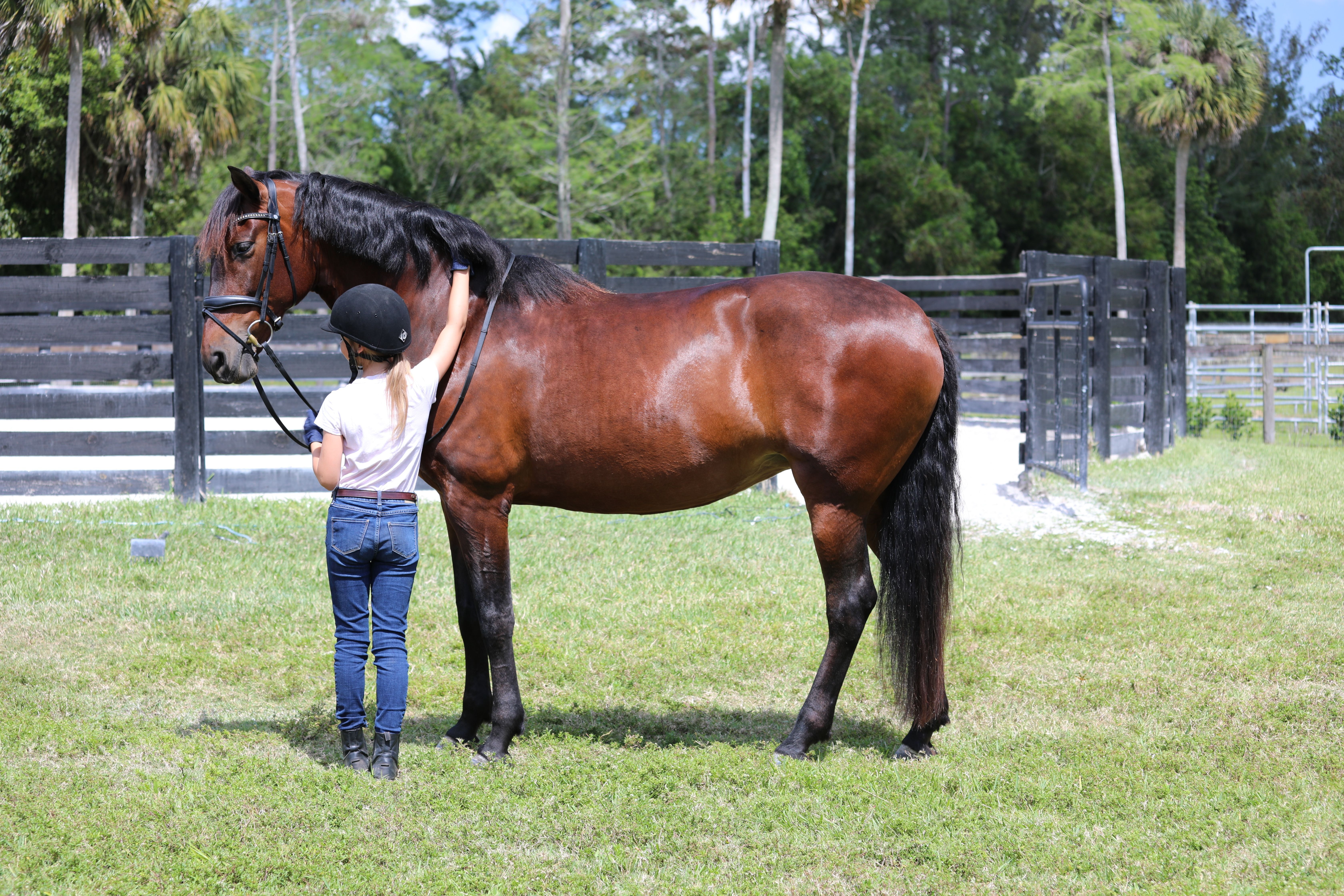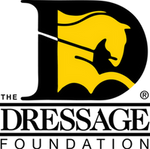
Thank you so much for the Cynthia Aspden Fund grant! I want to be the best horse person I can be for my horse, and I used the grant to train for six weeks in Wellington, Florida, as there are many learning opportunities in a very short distance. Thank you very much to TDF and all the donors for this grant. I brought my horse, Nessa, a 13-year-old PRE mare, to train with Hannah Irons, and I also audited the Dressage4Kids Winter Intensive Training Program and attended many events.
Competitions
I got to go to the Adequan Global Dressage Festival and watch some of the up-and-coming potential Olympic combinations including Adrienne Lyle with Lars and Endel Ots with Bohemian. It was fun to see horses that might go to the Olympics! I also watched fellow Dressage4Kids riders Tessa Holloran and Ben McWhorter compete at Global, and it was fun to support them. I also cheered on my trainer, Hannah Irons, during her Grand Prix Musical Freestyle debut with Scola Bella at White Fences, and I watched fellow D4K rider Addie Wallinovich compete at Third Level for the first time and get her scores for her USDF bronze medal! It was so much fun cheering everyone on and watching all the levels up to Grand Prix. COTA (the Challenge of the Americas) was a highlight – I had never seen Pas de Deux and Quadrille like that and it was really fun to see teams performing together.
Watching lessons
I had the chance to watch other people’s lessons, and it was a chance to see how other trainers teach and what other riders are working on. Some of the instructors I watched included David Marcus, Ali Brock, Amanda Perkowski, Claudio Oliveira, Oded Shimoni, Conrad Schumacher, and Lendon Gray. Here are some of the notes I took:
Conrad Schumacher teaching Jaralyn Gibson
- Warmup according to the individual horse
- Close the horse, then let them stretch (don’t just keep them closed)
- Relaxed arms and shoulder, tight hand, loose thumb (arms and shoulders need to stay relaxed for good contact)
- Contact needs to be elastic
- Riding is feel (not so much technical stuff)
Lendon Gray teaching the D4K Winter Intensive Training Program
- Is the canter rideable? Or are you cantering just because
- It’s not going to happen overnight
- Corners! Use them
- Everything you do forms a habit
- Use mirrors if you have them
- Do you have control?
- Steady contact
- Don’t drop your horse
- Leaning vs. stepping into your stirrup is different
- Don’t make your horse tight
- If it doesn’t work, try it at the walk
- Don’t overbend
- Half halt = short, don’t hang on your horse
- Sit back
- A half halt is only a half halt if you give – otherwise it’s a clutch
- Don’t do it unless you can do it to the best of your ability
Oded Shimoni teaching Quinn Ridgway
- Get the horse straight first, then do the changes
- If she doesn’t react to the aids you have to give them stronger aids, or try it differently, until she learns
Amanda Perkowski teaching the D4K Winter Intensive Training Program
- How are you bending?
- Elbows in
- Straight in the bending (meaning the horse still needs to be in alignment)
- The horse has to stay balanced
- Sit back and tall
Other events and activities
I also attended the 1st Annual Bridle Summit hosted by Horse by Horse at High Meadow Farm. It was really interesting to see how technology can help us learn more about our horses and how we can improve tack to help horses be more comfortable and move better.
With Dressage4Kids, I had the chance to attend Training4Teaching and I also had the chance to go to Hof Kasselmann to watch Lilly Kasselmann, Anna Christina Abbelen, Frederic Wandres. It was really fun to watch.
I also attended the 25th Anniversary Celebration for Dressage4Kids, and it was amazing to see so many people from the dressage community in one room.
My training with Hannah Irons
Before going to Florida, I had been working on Training Level. My horse shipped before me, and because I hadn’t ridden in a little while, I started with lunge lessons to help me center my seat and find my balance. We did a lot of suppling exercises on the lunge and coordination exercises to help improve the independence of my aids. After a lot of seat work, I found that communicating with Nessa became a lot easier and she listened a lot better to what I was trying to ask her. Nessa tends to want to get long and on her forehand, so we worked a lot on finding ways to help her keep her balance, including leg- yield, shoulder-fore, shoulder-in, and transitions. In the canter work, she sometimes overbends her neck and gets out of balance, so we worked a lot on the straightness and alignment and on my timing for when to ask her to shift her weight back so she wouldn’t get so long and low. We also started introducing half-steps because Nessa shows a talent for them and it’s fun to work on something else that can also help her step under herself. At the end of the 6 weeks, I rode through First Level Test 3 for the first time, and it was so much fun to ride. In addition to my lessons, I had the opportunity to be at the stables and around the horses a lot, and I think my stable management also improved over the 6 weeks I was there.
Conclusion
I had so many experiences I would not have otherwise had. Being able to go to competitions, attend lectures, watch other lessons, and take lessons myself was all such a great experience. I am learning so much about how to be a good rider for my horse, and I can’t wait for our future together. I hope that in another few years maybe I can go back to Wellington again to train. Thank you so much to The Dressage Foundation, to Dressage4Kids, and to all the members of the Dressage community who help young riders like me.
